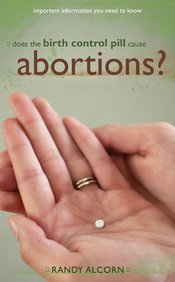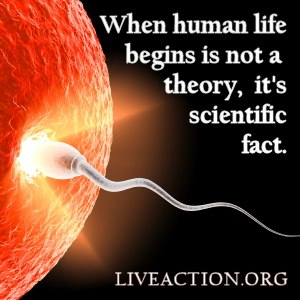![]()

By Randy Alcorn
Eternal Perspectives Ministries, Sandy Oregon
Author of Heaven
When does human life begin? At conception or implantation? Your answer determines how you’ll view the Affordable Care Act.
There has been a great deal of confusion about what exactly the Affordable Care Act mandates in regards to abortion and contraceptives. Some emphatically state the ACA does not mandate employers providing insurance that covers abortifacients for their employees. Some emphatically state it does. Both accuse each other of ignorance or deception.
Here’s an attempt to clear the waters, though I’m certain some commenters will disagree, since no matter what you say about this, you can always find websites that confidently proclaim something different! 🙂 So let me just say that we’re doing our best with this information, but I can’t guarantee whether or not there will be further changes.
The Affordable Care Act mandates all employers with over 50 employees to offer health insurance. This health insurance is mandated to provide “preventative care.” This preventative care is mandated to include FDA-approved contraceptives.
On February 1, 2013 the Department of Health and Human Services (HHS) released updated text regarding exemptions to the contraceptive mandate. The proposed changes would exempt only organizations that are religious non-profits from the contraceptive mandate.
All for-profit businesses (with over 50 employees) will be required to cover contraceptives, even if the owner of the company objects to contraceptives on moral and/or religious grounds. (This would include all Catholics who take seriously the teachings of their church.)
Though medical providers cannot be forced to commit an abortion due to a violation of conscience, there is no provision for the dispensing of contraceptives to be included as part of the “conscience protection” clause. (Thanks to EPM’s Julia Stager for researching most of the above for me!)
Many Christians do not think contraceptives are inherently wrong. But many of those same believers do not agree that the government has the right to violate the religious beliefs of others, and are aware that the next government-mandated step will likely be the violation of their own convictions.
United Health Care explains the effects of the ACA on women’s health issues, by making this definitive statement: “Abortion is not part of women’s expanded preventive services under the health reform law.”
That settles it, right? Well, yes, if you don’t read the two sentences from the same source that immediately follow the above: “The guidelines do require coverage of emergency contraceptive methods as prescribed. Accordingly, certain ‘morning after’ pills, such as Plan B® One-Step and ella®, which are FDA-approved emergency contraception, will be covered as prescribed.” (read the full text)
So the ACA supposedly doesn’t mandate coverage of abortions, but it does mandate coverage of chemicals that can cause abortions, as long as they are called “contraceptives” rather than abortifacients.
The problem is that morning after pills are taken too late to prevent conception. What they can prevent is implantation of an already conceived human being. If human life begins at conception, whatever ends that life, no matter how early, is an abortifacient.
The fact that it’s caused by a chemical “contraceptive” rather than by the instrument of an abortionist doesn’t make it a non-abortion. It just makes it a nonsurgical abortion occurring when the child is very young.
So the critical question is: When does human life begin?
If you believe life doesn’t begin until implantation, then you can say that what prevents implantation is not an abortifacient. Only then can you make a sincere claim that “abortion is not part of” this health care requirement. The problem is, in my opinion, based on many hours of studying what happens at the moment of conception, you would be sincerely wrong.
 Here’s what I wrote about whether life begins at conception or implantation, in my book Does the Birth Control Pill Cause Abortions?:
Here’s what I wrote about whether life begins at conception or implantation, in my book Does the Birth Control Pill Cause Abortions?:
According to the meaning conception always had—which is the meaning still held to by the vast majority of the public and many if not most medical professionals—there is no way any product is acting as a contraceptive when it prevents implantation. (Call it a contra-implantive, if you wish, but when it works in that way it is not a contra-ceptive.)
In this book, I use “conception” in its classic sense—as a synonym for fertilization, the point at which the new human life begins. Contraceptives, then, are chemicals or devices that prevent conception or fertilization. A birth control method that sometimes kills an already conceived human being is not merely a contraceptive. It may function as a contraceptive some or most of the time, but some of the time it is also an abortifacient.
The problem of “contraceptives” that are really abortifacients is not a new one. Many prolife Christians, including physicians, have long opposed the use of Intra-Uterine Devices (IUDs), as well as RU-486 (“the abortion pill”) and the Emergency Contraceptive Pill (ECP). Some, though not all, have also opposed Norplant, Depo-Provera, NuvaRing and the “Mini-pill,” all of which sometimes or often fail to prevent conception, but succeed in preventing implantation of the six day old human being. (For more details, see “The IUD, Norplant, Depo-Provera, NuvaRing, RU-486, and the Mini-Pill.”)
But what about the widely used birth control pill, with its combined estrogen and progestin? Is it exclusively a contraceptive? That is, does it always prevent conception? Or does it, like other products, sometimes prevent implantation, thus producing an early abortion? That is the central question of my book. If you are interested, I cite dozens and dozens of medical sources which, in my opinion, prove that each human life begins at conception, not at implantation or some later time.
Here are just a few of those.
Dr. Alfred M. Bongioanni, professor of obstetrics, University of Pennsylvania:
“I have learned from my earliest medical education that human life begins at the time of conception. I submit that human life is present throughout this entire sequence from conception to adulthood and any interruption at any point throughout this time constitutes a termination of human life.”
Dr. Jerome LeJeune, genetics professor at the University of Descartes in Paris (discoverer of the Down Syndrome chromosome):
“After fertilization has taken place a new human being has come into being…This is no longer a matter of taste or opinion. Each individual has a very neat beginning, at conception.”
Professor Micheline Matthews-Roth, Harvard University Medical School:
“It is scientifically correct to say that an individual human life begins at conception.”
Professor Hymie Gordon, Mayo Clinic:
“By all the criteria of modern molecular biology, life is present from the moment of conception.”
Dr. Watson A. Bowes, University of Colorado Medical School:
“The beginning of a single human life is from a biological point of view a simple and straightforward matter—the beginning is conception.”
Dr. Landrum Shettles, pioneer in sperm biology, fertility and sterility, discoverer of male- and female-producing sperm:
“I oppose abortion. I do so, first, because I accept what is biologically manifest—that human life commences at the time of conception—and, second, because I believe it is wrong to take innocent human life under any circumstances.”
Does the Bible agree with the scientific evidence that life begins at conception? Read these passages and decide for yourself:
“The babies [Jacob and Esau] jostled each other within her [Rebekah].” (Genesis 25:22)
“If men fight and hurt a woman with child, so that she gives birth prematurely…” (Exodus 21:22)
“As you do not know…how the bones grow in the womb of her who is with child…” (Ecclesiastes 11:5)
Note: in each of the above references God calls that which a pregnant woman carries a “child.”
“In the womb he [Jacob] grasped his brother’s heel; as a man he struggled with God.” (Hosea 12:3)
“Your hands shaped me and made me. Will you now turn and destroy me? Remember that you molded me like clay. Will you now turn me to dust again? Did you not pour me out like milk and curdle me like cheese, clothe me with skin and flesh and knit me together with bones and sinews? You gave me life and showed me kindness, and in your providence watched over my spirit.” (Job 10:8-12)
“Did not he who made me in the womb make them? Did not the same one form us both within our mothers?” (Job 31:15)
“For you created my inmost being; you knit me together in my mother’s womb. I praise you because I am fearfully and wonderfully made…My frame was not hidden from you when I was made in the secret place. When I was woven together in the depths of the earth, your eyes saw my unformed body. All the days ordained for me were written in your book before one of them came to be.” (Psalm 139:13-16)
“Surely I was sinful at birth; sinful from the time my mother conceived me.” (Psalm 51:5)
Note: Only a person can have a sin nature. David’s statement clearly shows he was a person at the point of conception.
“Before I formed you in the womb I knew you, before you were born I set you apart; I appointed you as a prophet to the nations.” (Jeremiah 1:5)
“His mother Mary… as found to be with child through the Holy Spirit…[the angel said] ‘what is conceived in her is from the Holy Spirit.’” (Matthew 1:18-20)
“But the angel said to Mary ‘you will be with child and give birth to a son, and you are to give him the name Jesus…The Holy Spirit will come upon you, and the power of the Most High will overshadow you. So the holy one to be born will be called the Son of God.’” (Luke 1:30-31, 35)
Summary of Luke 1:39-44: After the angel left, Mary “hurried” (v. 39) to get to Elizabeth. Unborn John the Baptist (in his 6th month after conception) responded to the presence of unborn Jesus inside Mary. Allowing for travel time, Jesus was no more than eight to ten days beyond conception when they arrived. Implantation doesn’t begin until six days after conception and isn’t complete until twelve—most likely Jesus was not yet fully implanted in his mother’s womb when unborn John responded to his presence.
“The Word became flesh and made his dwelling among us. We have seen his glory, the glory of the One and Only, who came from the Father, full of grace and truth.” (John 1:14)
When did the Word (Christ) become flesh? When did he leave heaven and come to earth? Was there generic soul-less flesh conceived in Mary waiting for Christ to inhabit it later in the pregnancy? No—it is basic Christian doctrine that Christ became flesh at the moment the Holy Spirit overshadowed Mary, at the moment of fertilization. He became human at the exact point all others become human, the point of conception. The “blastocyst” is an eternal human soul, literally “the least of these [vulnerable people],” Christ’s brethren (Matthew 25:40).
 You must decide whether you believe both the scientific and biblical evidence, or either of them. But if you do not believe that human life begins at conception, you need to ask yourself whether it’s because of lack of evidence or your desire not to believe the evidence. If indeed human life does begin at the point of conception, when the new and never-before-existing DNA of a unique person comes into existence, then the ACA certainly should violate your conscience.
You must decide whether you believe both the scientific and biblical evidence, or either of them. But if you do not believe that human life begins at conception, you need to ask yourself whether it’s because of lack of evidence or your desire not to believe the evidence. If indeed human life does begin at the point of conception, when the new and never-before-existing DNA of a unique person comes into existence, then the ACA certainly should violate your conscience.
The ACA requires insurance coverage that includes proven abortifacients such as the morning after pill, as well as the standard birth control pill, which according to every company that produces it, sometimes fails to prevent ovulation, and when it does can cause a fertilized egg (human being) not to implant in the altered endometrium. Therefore, despite the semantics and the claims to the contrary, this law does indeed require employers with 50 or more employees to pay for insurance coverage of chemicals that will result in abortions.
Disclaimer: Articles featured on Oregon Report are the creation, responsibility and opinion of the authoring individual or organization which is featured at the top of every article.

